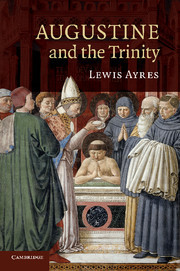Description
Augustine and the Trinity
Author: Ayres Lewis
A new treatment of Augustine's highly influential theology of the Trinity, challenging the long-held assumption that he over-emphasized God's unity.
Language: English
Subject for Augustine and the Trinity:
Approximative price 56.06 €
In Print (Delivery period: 14 days).
Add to cart
Augustine and the Trinity
Publication date: 01-2014
Support: Print on demand
Publication date: 01-2014
Support: Print on demand
Approximative price 110.37 €
In Print (Delivery period: 14 days).
Add to cart
Augustine and the trinity
Publication date: 11-2010
376 p. · 15.6x23.4 cm · Hardback
Publication date: 11-2010
376 p. · 15.6x23.4 cm · Hardback
Description
/li>Contents
/li>Biography
/li>
Augustine of Hippo (354?430) strongly influenced western theology, but he has often been accused of over-emphasizing the unity of God to the detriment of the Trinity. In Augustine and the Trinity, Lewis Ayres offers a new treatment of this important figure, demonstrating how Augustine's writings offer one of the most sophisticated early theologies of the Trinity developed after the Council of Nicaea (325). Building on recent research, Ayres argues that Augustine was influenced by a wide variety of earlier Latin Christian traditions which stressed the irreducibility of Father, Son and Spirit. Augustine combines these traditions with material from non-Christian Neoplatonists in a very personal synthesis. Ayres also argues that Augustine shaped a powerful account of Christian ascent toward understanding of, as well as participation in the divine life, one that begins in faith and models itself on Christ's humility.
Abbreviations; Introduction; Part I. Origins: 1. Giving wings to Nicaea; 2. Through Him, with Him and in Him; 3. Faith of our fathers: De fide et symbolo; Part II. Ascent: 4. The unadorned Trinity; Excursus 1: The dating of the De trinitate; 5. Per corporalia … ad incorporalia; 6. A Christological epistemology; Excursus 2: Polemical targets in the De trinitate; Part III. Into the Mystery: 7. Recommending the source; 8. Essence from essence; 9. Showing, seeing and loving; 10. Loving and being; Part IV. Memory, Intelligence and Will: 11. 'But it's not fur eatin'…'; 12. '… It's just fur lookin' through'; Epilogue: catching all three; Bibliography.
Lewis Ayres is Bede Professor of Catholic Theology at the University of Durham. He is co-editor with Frances Young and Andrew Louth of The Cambridge History of Early Christian Literature (2004).
© 2024 LAVOISIER S.A.S.
These books may interest you

Augustine and Liberal Education 36.43 €

Augustine and Liberal Education 129.87 €


